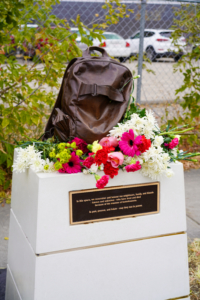Musical duo donates t-shirt sales


Misgana and Ans own a local clothing company, and have direct a portion of their sales to Calgary Homeless Foundation.
At Calgary Homeless Foundation, we’re inspired by you – our community donors – and we’re always eager to know why you connect to our work and how you learned about us. That’s why when we received a large donation from a new donor at the beginning of February, we just had to find out more about their story.
Misgana – who goes by Mizzy – and Ans own a clothing brand, originally founded to sell merchandise to accompany their music. Like their music, their clothing is an expression of their creativity. To eliminate profit as a motivator when creating a new design, they decided to direct all proceeds from the sale of a t-shirt to Calgary Homeless Foundation.
“We just wanted to do something really creative and make something unique,” says Mizzy. “Making a fundraiser just allowed us to forget about profit and focus on the creativity.”
Mizzy screen-printed nearly 100 shirts in his bedroom before launching the design on the duo’s website. They approached several local businesses, who featured the design in their storefronts. Within a few days, the design had sold out.
“I’m not originally from Calgary, but every time I came here, everyone told me how cold it was,” explains Ans. “When you’re driving around, and you see people on the streets, you’re always wondering how they get by. We wished we could all do something, so we chose to direct the proceeds towards homelessness.”
“We’re at a place where we can pay our bills, but it wasn’t always like that,” adds Mizzy. “I think when you get to a place like that, you shouldn’t forget people who don’t have as much as you. It’s better for your heart, and when you go out of your way to help someone else, it lifts everyone up. The whole place gets better.”
Ans and Mizzy appreciated the opportunity to use their passion to benefit the community. The campaign also expanded their skillset. They learned how to manage the high product volume, and as the t-shirts began to sell, they were encouraged by the local support. They found their customer base got excited about the t-shirt design and felt good about contributing to a local cause.
“Everyone wishes they could get to a place in their life where they can help people. The truth is, that’s not how it works” says Ans.
“You don’t have to be making a specific amount or be in a certain spot to take care of people. If you are helping one person, you never know how that will impact others.”


 Submitted by: Patricia Jones, President and CEO, Calgary Homeless Foundation and Karen Young, President and CEO, United Way of Calgary and Area.
Submitted by: Patricia Jones, President and CEO, Calgary Homeless Foundation and Karen Young, President and CEO, United Way of Calgary and Area.
 With tears, flowers, and a song for a friend who can no longer be found, Calgarians gathered on a cold morning on October 13, 2021 for a reflective ceremony marking the installation of the city’s first and only permanent homeless memorial.
With tears, flowers, and a song for a friend who can no longer be found, Calgarians gathered on a cold morning on October 13, 2021 for a reflective ceremony marking the installation of the city’s first and only permanent homeless memorial.
